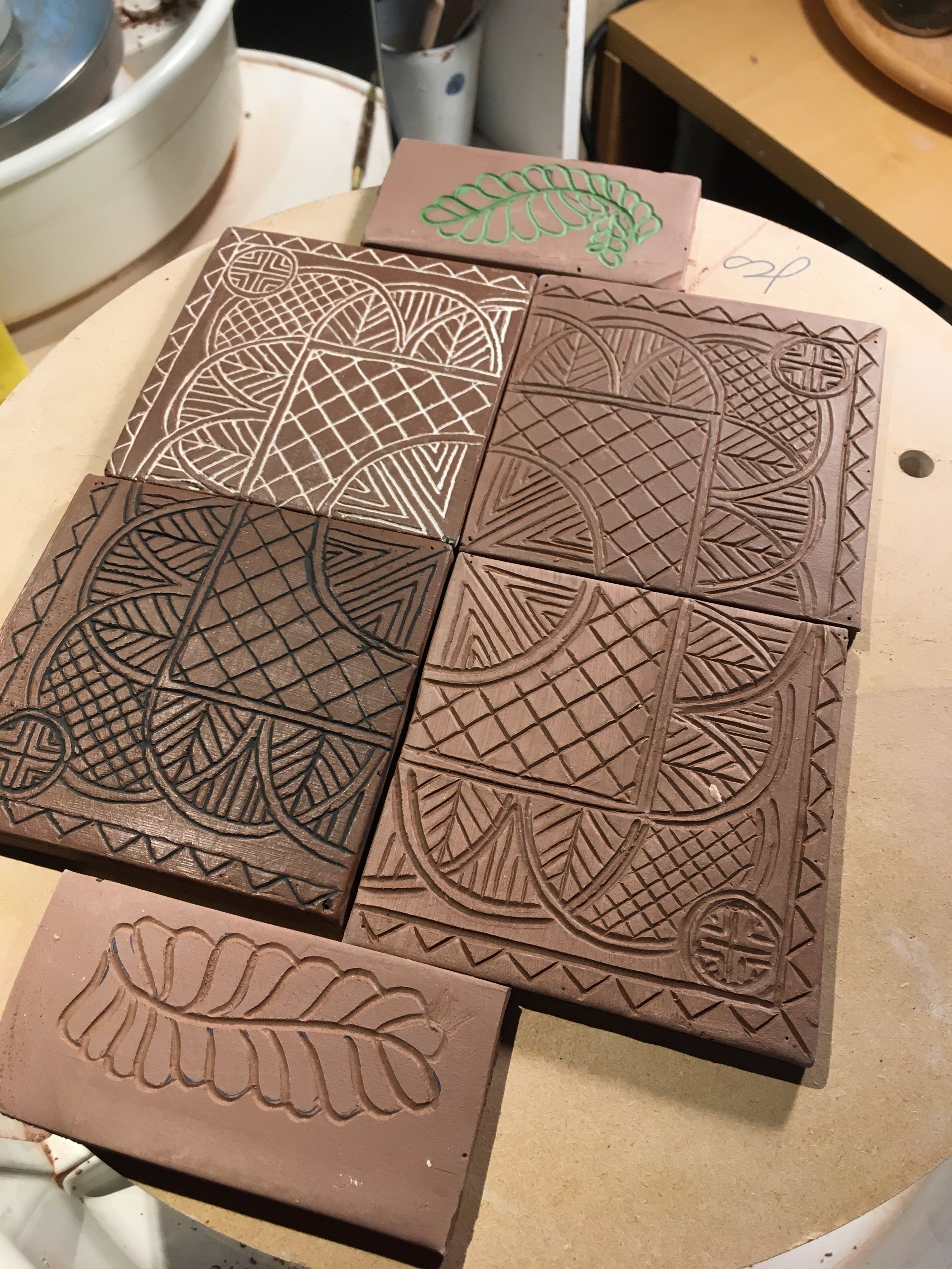Progress over Perfection
Tiles in progress; red clay tiles with a pattern etched into them on a pottery batt.
One of the aspects of creativity that you have to be careful about, is seeking perfection. There is too much of a temptation to try to make the perfect hat, the perfect painting, the perfect loaf of bread.
Perfection doesn’t exist.
If we strive for perfection, all we’re going to get in the end is stressed, and that’s counterintuitive to creativity.
Now, that also doesn’t mean we should settle for the mundane if we’re working on a big project. One of the best pieces of advice I’ve ever heard that bridges the quest for perfection and simply being “meh” was from the late Dom Famularo: “Better is the enemy of good enough.”
Good enough is okay when we’re starting out and learning the ropes so we can move on to the next step. The next time we work on a project, we should ask ourselves “is this good enough, or can it be better?” If it can be better, take some time and make it better; if you don’t feel it can be better, than be happy with what you’ve accomplished.
Perfection is something elusive, something people are constantly searching for over that next horizon, in that next job, in that next opportunity, without really committing to and working with what they have to make it better, or even the best that they can do. That is different than perfection.
Perfection is an ideal, a vague concept of something we think it should be (whatever “it” may be). If we’re always striving for that ideal end or that ideal item, we will never appreciate the gains we have made, and what we have accomplished along the way.
That’s why “better” is better to strive for then “perfect”.
Better makes us look back at what we did yesterday and say, “oh! This is better than what I did then!” Or conversely, “this is not as good as what I did yesterday; I can do better,” and so our techniques improve. Improving our skills is one of the positive aspects of creativity. We’re able to develop our skills more each day by striving for better, and come away with a greater feeling of satisfaction than if we were seeking perfect. “Ahhh! That’s better!”
I suppose this relates a little to what Dan Sullivan and Dr. Benjamin Hardy talk about in “the Gap and the Gain” — if we’re always striving for ideal and feel we haven’t met that yet, we’ll always feel like we’re coming up short. If we look at where we started and what we’ve accomplished, we’ll always feel like we’ve gained and we are more positive about our progress.
And in case I haven’t mentioned it in a while, life is about progress, not perfection.
Because creativity is life, it’s about progress, too!
That’s why Dom’s quote resonates with me so much. Remember this: “Better is the enemy of good enough.”
Pottery is a great example of where “good enough” can be a mediocre thing. I know; I spent over 16 years in pottery classes, most of which by the end of class you had to say “that’s good enough” because you had to pack up and head home for the week. If you were lucky enough to have some spare time on the weekend you could go to the open studio time and tweak the piece, trying to make it just a little better, and you were more satisfied with the outcome. Frankly, if I was glazing that week by the time the end of the night came, I chose whatever glaze had been stirred up the most rather than trying to struggle to get the glaze I wanted to use to the right consistency. I was complacent and settled for “good enough” too often. In fairness, that was often at the end of a 12 hour day, so not a lot of energy was left for “better.”
Now that I have space I can work on pottery at my own pace (but still at the beck and call of clay timing), I am able to apply “better” to the process. I can make that seam better. I can make a better decision about how to decorate it. I can be better about cleaning up and ensuring I’ve got a tidy workspace for the next time I start. Everything about “better” feels good and productive, whereas when I think about trying to make something “perfect” I feel like I’ve failed before I even start. The clay isn’t the perfect texture to throw; the wheel isn’t the perfect speed; the slab isn’t the perfect consistency or it’s not perfectly even.
If we wait for perfect, the time will never be right.
If we wait for perfect, the painting will never be done.
If we try for perfect, we will never be satisfied.
But we can all be a little better each day. We can all be a little better than we were the day before at communicating, learning, sharing, growing, and making things.
Better isn’t just the enemy of good enough; Better is the cure for perfectionism. :)
Thank you, Dom!
If you haven’t read it, I highly recommend Dom’s book “The Cycle of Self Empowerment.”

